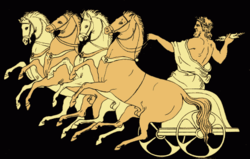Zeus on Ancient Greek Coins for
Sale & Story of Prometheus Thief of Fire by Ancient Coin Expert
Own certified authentic ancient coins of Zeus
You can
explore a selection of other emperor and empress coins by visiting the
chronological list of every emperor and empress of
the Roman empire. Ancient coins make a great gift, investment and a
teaching aid to learning history. It is important to deal
with trusted coin dealers, that is why this is the best place for you to
shop online.
In the
ancient Greek
religion,
Zeus
zews
zooss;
Ancient Greek:
Ζεύς;
Modern Greek:
Δίας, Dias) was the "Father of Gods and men" (πατὴρ
ἀνδρῶν τε θεῶν τε) who ruled the Olympians of
Mount Olympus
as a father ruled the family. He was the
god of sky
and
thunder
in
Greek
mythology. His
Roman
counterpart is
Jupiter
and
Etruscan
counterpart is
Tinia.![The Jupiter de Smyrne, discovered in Smyrna in 1680[1]](http://upload.wikimedia.org/wikipedia/commons/thumb/c/c8/Jupiter_Smyrna_Louvre_Ma13.jpg/200px-Jupiter_Smyrna_Louvre_Ma13.jpg)
Zeus was the child of
Cronus
and
Rhea,
and the youngest of his siblings. In most traditions he was married to
Hera,
although, at the oracle of
Dodona,
his consort was
Dione:
according to the
Iliad,
he is the father of
Aphrodite
by Dione. He is known for his erotic escapades. These resulted in many
godly and heroic offspring, including
Athena,
Apollo
and
Artemis,
Hermes,
Persephone
(by
Demeter),
Dionysus,
Perseus,
Heracles,
Helen of Troy,
Minos,
and the
Muses
(by
Mnemosyne);
by Hera, he is usually said to have fathered
Ares,
Hebe
and
Hephaestus.
As
Walter Burkert
points out in his book, Greek Religion, "Even the gods who are
not his natural children address him as Father, and all the gods rise in
his presence."[6]
For the Greeks, he was the
King of the
Gods, who oversaw the universe. As
Pausanias
observed, "That Zeus is king in heaven is a saying common to all men".
In Hesiod's
Theogony
Zeus assigns the various gods their roles. In the
Homeric Hymns
he is referred to as the chieftain of the gods.
His symbols are the
thunderbolt,
eagle,
bull,
and
oak.
In addition to his Indo-European inheritance, the classical
"cloud-gatherer" also derives certain iconographic traits from the
cultures of the
Ancient Near
East, such as the
scepter.
Zeus is frequently depicted by Greek artists in one of two poses:
standing, striding forward, with a thunderbolt leveled in his raised
right hand, or seated in majesty.
Etymology

The Chariot of Zeus, from an 1879 Stories from the Greek
Tragedians by Alfred Church
In Greek, the god's name is Ζεύς
Zeús
/zdeús/ or
/dzeús/ (Modern Greek
/ˈzefs/) in the
nominative
case and Διός
Diós in the
genitive case.
The earliest forms of the name are the
Mycenaean
Greek di-we and di-wo, written in
Linear b
syllabic script. With the apparent interchangeability of "z" and "d",
Zeus can also be
Deus.
Zeus, poetically referred to by the
vocative
Zeu pater ("O, father Zeus"), is a continuation of *Di̯ēus,
the
Proto-Indo-European god of the daytime sky, also
called *Dyeus
ph2tēr ("Sky Father"). The god is known under this
name in
Sanskrit
(compare
Dyaus/Dyaus
Pita),
Latin
(compare
Jupiter,
from Iuppiter, deriving from the
Proto-Indo-European vocative *dyeu-ph2tēr[10]),
deriving from the basic form *dyeu- ("to shine", and in its many
derivatives, "sky, heaven, god"). And in
Germanic
mythology (compare *Tīwaz
>
Old High
German language Ziu,
Old Norse
Týr),
together with Latin deus, dīvus and Dis (a
variation of dīves[11]),
from the related noun *deiwos. To the Greeks and Romans, the god
of the sky was also the supreme god. Zeus is the only deity in the
Olympic
pantheon
whose name has such a transparent Indo-European etymology. |